E1144 Certificate III in Individual Support (Ageing) Module 8 Test
VerifiedAdded on 2020/05/28
|33
|6494
|224
Homework Assignment
AI Summary
This document is a completed homework assignment for the E1144 Certificate III in Individual Support (Ageing, Home and Community) Module 8 Knowledge Test. The assignment covers key concepts in aged care, including person-centered practice, consumer-directed care, and the balance between empowerment and disempowerment. The student provides definitions and examples for each approach. The assignment also includes case studies. The first case study focuses on Mrs. Brady, a 98-year-old woman with dementia, and explores how a consumer-directed care package could address her needs. The second case study examines a situation where an elderly man, Mr. Jones, is being disempowered by his daughter. The student identifies the areas of disempowerment and outlines the actions taken to empower Mr. Jones. The student provides detailed answers to all questions, demonstrating an understanding of the principles of individual support and aged care practices.
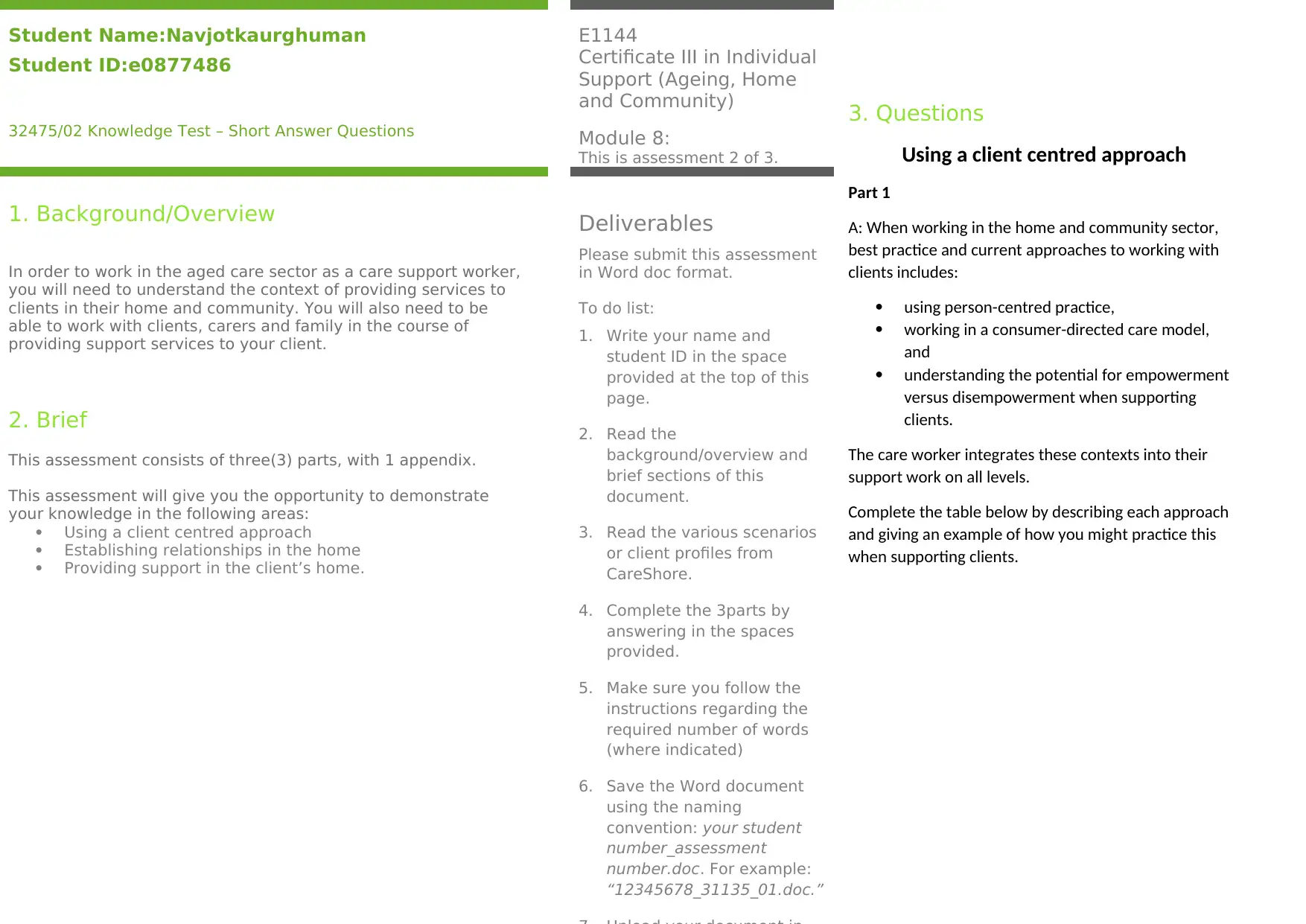
3. Questions
Using a client centred approach
Part 1
A: When working in the home and community sector,
best practice and current approaches to working with
clients includes:
using person-centred practice,
working in a consumer-directed care model,
and
understanding the potential for empowerment
versus disempowerment when supporting
clients.
The care worker integrates these contexts into their
support work on all levels.
Complete the table below by describing each approach
and giving an example of how you might practice this
when supporting clients.
Student Name:Navjotkaurghuman
Student ID:e0877486
32475/02 Knowledge Test – Short Answer Questions
E1144
Certificate III in Individual
Support (Ageing, Home
and Community)
Module 8:
This is assessment 2 of 3.
1. Background/Overview
In order to work in the aged care sector as a care support worker,
you will need to understand the context of providing services to
clients in their home and community. You will also need to be
able to work with clients, carers and family in the course of
providing support services to your client.
2. Brief
This assessment consists of three(3) parts, with 1 appendix.
This assessment will give you the opportunity to demonstrate
your knowledge in the following areas:
Using a client centred approach
Establishing relationships in the home
Providing support in the client’s home.
Deliverables
Please submit this assessment
in Word doc format.
To do list:
1. Write your name and
student ID in the space
provided at the top of this
page.
2. Read the
background/overview and
brief sections of this
document.
3. Read the various scenarios
or client profiles from
CareShore.
4. Complete the 3parts by
answering in the spaces
provided.
5. Make sure you follow the
instructions regarding the
required number of words
(where indicated)
6. Save the Word document
using the naming
convention: your student
number_assessment
number.doc. For example:
“12345678_31135_01.doc.”
Using a client centred approach
Part 1
A: When working in the home and community sector,
best practice and current approaches to working with
clients includes:
using person-centred practice,
working in a consumer-directed care model,
and
understanding the potential for empowerment
versus disempowerment when supporting
clients.
The care worker integrates these contexts into their
support work on all levels.
Complete the table below by describing each approach
and giving an example of how you might practice this
when supporting clients.
Student Name:Navjotkaurghuman
Student ID:e0877486
32475/02 Knowledge Test – Short Answer Questions
E1144
Certificate III in Individual
Support (Ageing, Home
and Community)
Module 8:
This is assessment 2 of 3.
1. Background/Overview
In order to work in the aged care sector as a care support worker,
you will need to understand the context of providing services to
clients in their home and community. You will also need to be
able to work with clients, carers and family in the course of
providing support services to your client.
2. Brief
This assessment consists of three(3) parts, with 1 appendix.
This assessment will give you the opportunity to demonstrate
your knowledge in the following areas:
Using a client centred approach
Establishing relationships in the home
Providing support in the client’s home.
Deliverables
Please submit this assessment
in Word doc format.
To do list:
1. Write your name and
student ID in the space
provided at the top of this
page.
2. Read the
background/overview and
brief sections of this
document.
3. Read the various scenarios
or client profiles from
CareShore.
4. Complete the 3parts by
answering in the spaces
provided.
5. Make sure you follow the
instructions regarding the
required number of words
(where indicated)
6. Save the Word document
using the naming
convention: your student
number_assessment
number.doc. For example:
“12345678_31135_01.doc.”
Paraphrase This Document
Need a fresh take? Get an instant paraphrase of this document with our AI Paraphraser
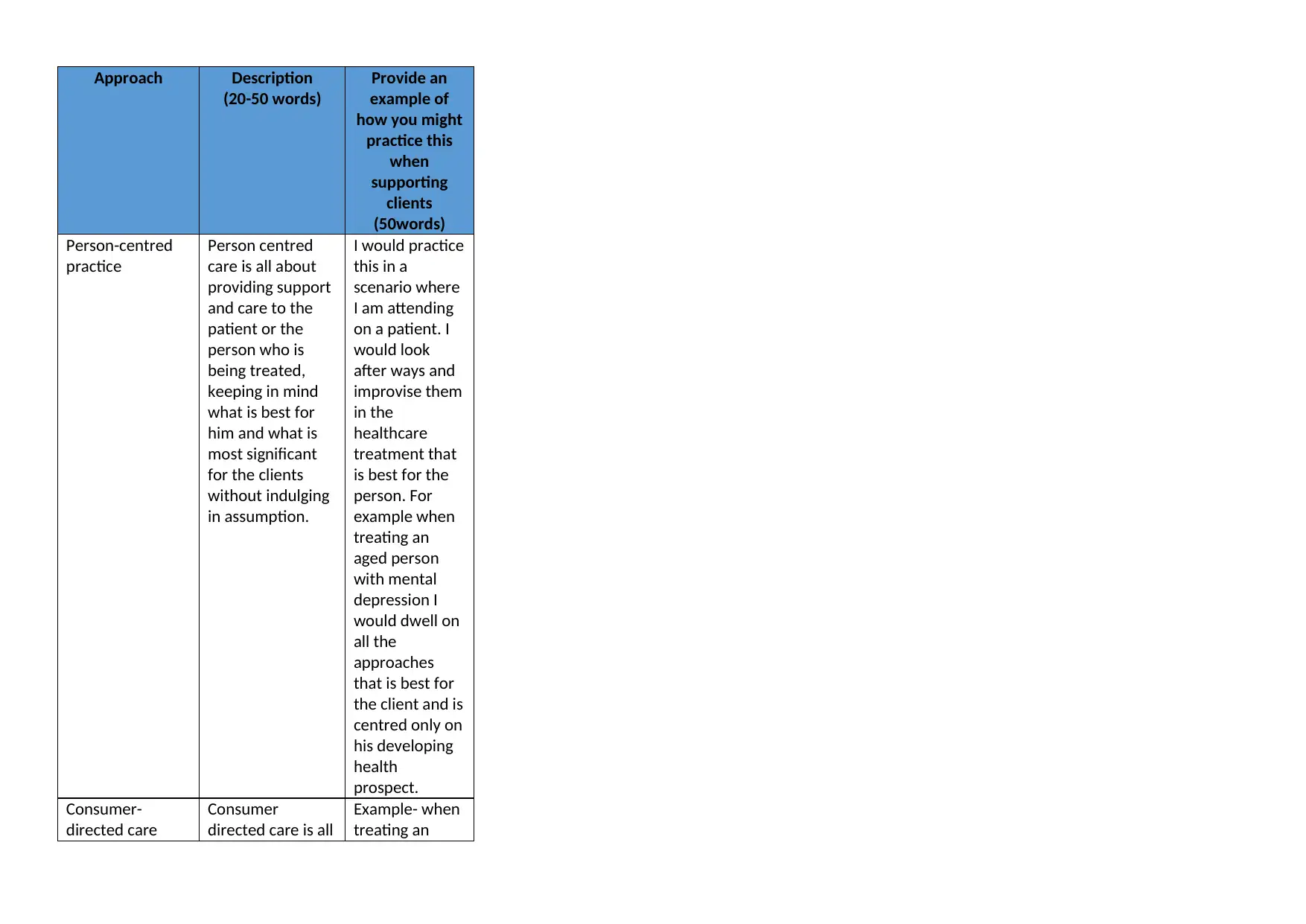
Approach Description
(20-50 words)
Provide an
example of
how you might
practice this
when
supporting
clients
(50words)
Person-centred
practice
Person centred
care is all about
providing support
and care to the
patient or the
person who is
being treated,
keeping in mind
what is best for
him and what is
most significant
for the clients
without indulging
in assumption.
I would practice
this in a
scenario where
I am attending
on a patient. I
would look
after ways and
improvise them
in the
healthcare
treatment that
is best for the
person. For
example when
treating an
aged person
with mental
depression I
would dwell on
all the
approaches
that is best for
the client and is
centred only on
his developing
health
prospect.
Consumer-
directed care
Consumer
directed care is all
Example- when
treating an
(20-50 words)
Provide an
example of
how you might
practice this
when
supporting
clients
(50words)
Person-centred
practice
Person centred
care is all about
providing support
and care to the
patient or the
person who is
being treated,
keeping in mind
what is best for
him and what is
most significant
for the clients
without indulging
in assumption.
I would practice
this in a
scenario where
I am attending
on a patient. I
would look
after ways and
improvise them
in the
healthcare
treatment that
is best for the
person. For
example when
treating an
aged person
with mental
depression I
would dwell on
all the
approaches
that is best for
the client and is
centred only on
his developing
health
prospect.
Consumer-
directed care
Consumer
directed care is all
Example- when
treating an
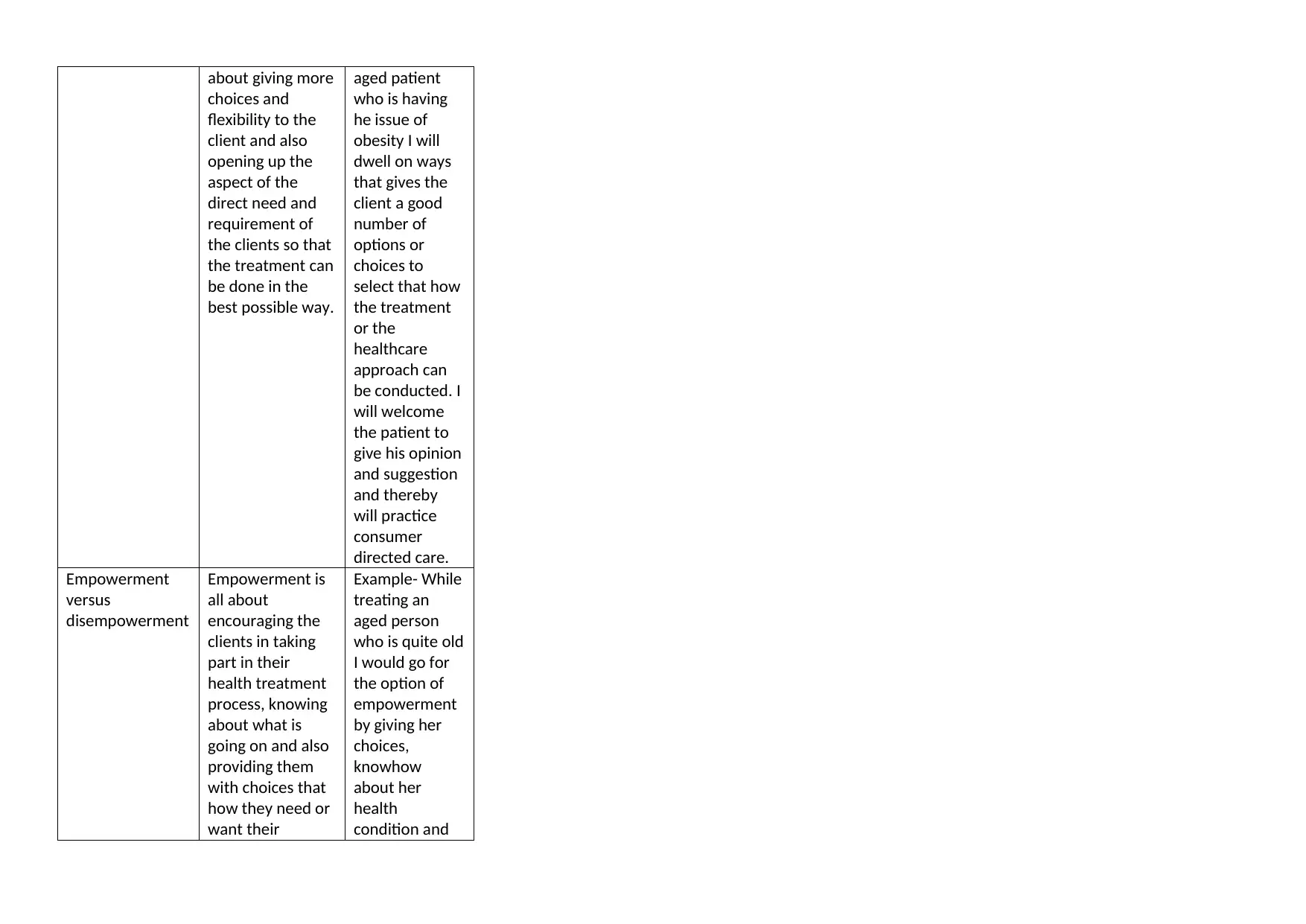
about giving more
choices and
flexibility to the
client and also
opening up the
aspect of the
direct need and
requirement of
the clients so that
the treatment can
be done in the
best possible way.
aged patient
who is having
he issue of
obesity I will
dwell on ways
that gives the
client a good
number of
options or
choices to
select that how
the treatment
or the
healthcare
approach can
be conducted. I
will welcome
the patient to
give his opinion
and suggestion
and thereby
will practice
consumer
directed care.
Empowerment
versus
disempowerment
Empowerment is
all about
encouraging the
clients in taking
part in their
health treatment
process, knowing
about what is
going on and also
providing them
with choices that
how they need or
want their
Example- While
treating an
aged person
who is quite old
I would go for
the option of
empowerment
by giving her
choices,
knowhow
about her
health
condition and
choices and
flexibility to the
client and also
opening up the
aspect of the
direct need and
requirement of
the clients so that
the treatment can
be done in the
best possible way.
aged patient
who is having
he issue of
obesity I will
dwell on ways
that gives the
client a good
number of
options or
choices to
select that how
the treatment
or the
healthcare
approach can
be conducted. I
will welcome
the patient to
give his opinion
and suggestion
and thereby
will practice
consumer
directed care.
Empowerment
versus
disempowerment
Empowerment is
all about
encouraging the
clients in taking
part in their
health treatment
process, knowing
about what is
going on and also
providing them
with choices that
how they need or
want their
Example- While
treating an
aged person
who is quite old
I would go for
the option of
empowerment
by giving her
choices,
knowhow
about her
health
condition and
⊘ This is a preview!⊘
Do you want full access?
Subscribe today to unlock all pages.

Trusted by 1+ million students worldwide

treatment to be
like whereas
disempowerment
is all about
denying health
care to the client,
not encouraging
them to take part
in healthcare
process or in
decision making
process and
others.
also giving her
the option to
suggestrather
than denying all
these basic
rights which are
otherwise given
to other clients.
Satisfactory
like whereas
disempowerment
is all about
denying health
care to the client,
not encouraging
them to take part
in healthcare
process or in
decision making
process and
others.
also giving her
the option to
suggestrather
than denying all
these basic
rights which are
otherwise given
to other clients.
Satisfactory
Paraphrase This Document
Need a fresh take? Get an instant paraphrase of this document with our AI Paraphraser

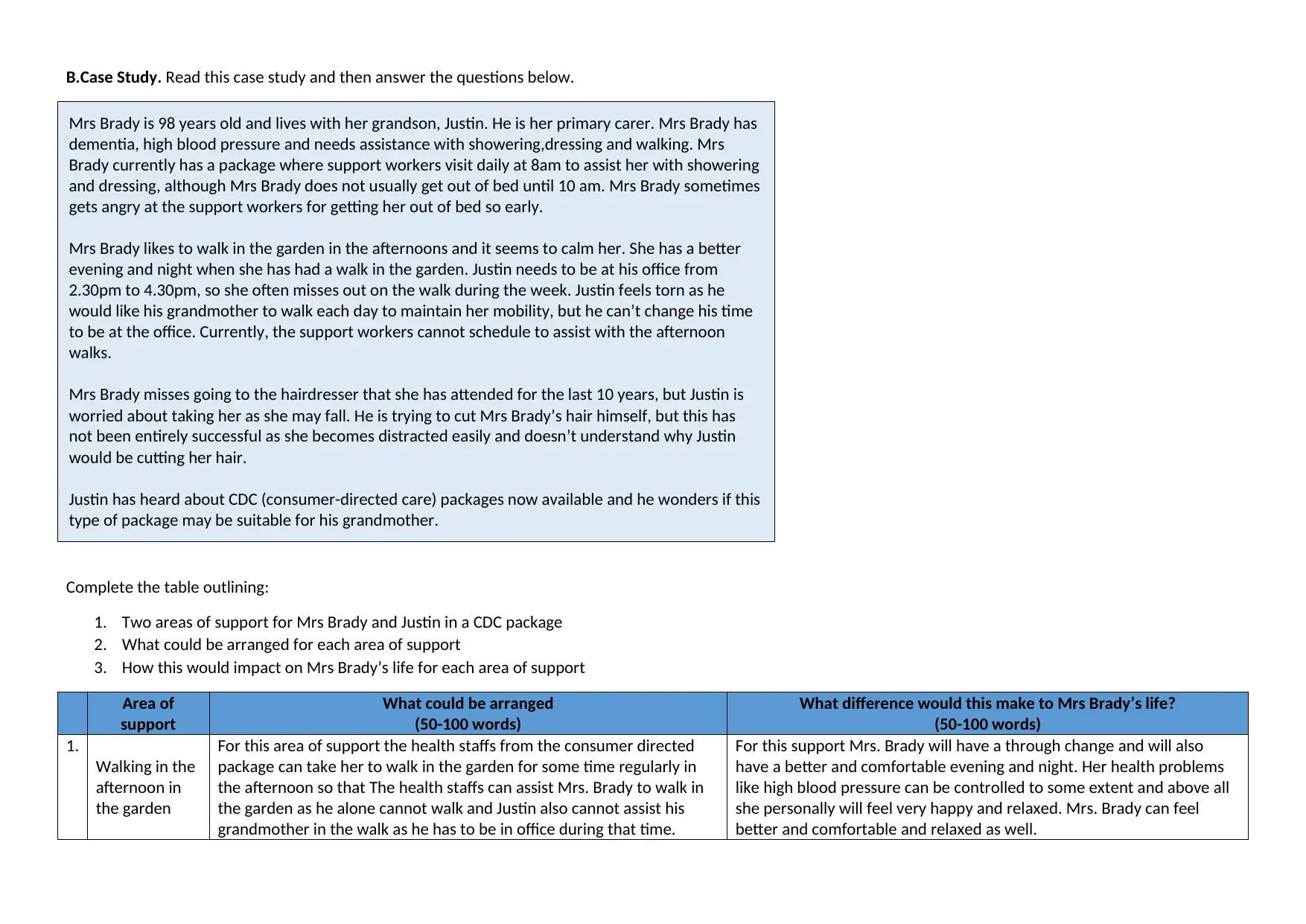
B.Case Study. Read this case study and then answer the questions below.
Mrs Brady is 98 years old and lives with her grandson, Justin. He is her primary carer. Mrs Brady has
dementia, high blood pressure and needs assistance with showering,dressing and walking. Mrs
Brady currently has a package where support workers visit daily at 8am to assist her with showering
and dressing, although Mrs Brady does not usually get out of bed until 10 am. Mrs Brady sometimes
gets angry at the support workers for getting her out of bed so early.
Mrs Brady likes to walk in the garden in the afternoons and it seems to calm her. She has a better
evening and night when she has had a walk in the garden. Justin needs to be at his office from
2.30pm to 4.30pm, so she often misses out on the walk during the week. Justin feels torn as he
would like his grandmother to walk each day to maintain her mobility, but he can’t change his time
to be at the office. Currently, the support workers cannot schedule to assist with the afternoon
walks.
Mrs Brady misses going to the hairdresser that she has attended for the last 10 years, but Justin is
worried about taking her as she may fall. He is trying to cut Mrs Brady’s hair himself, but this has
not been entirely successful as she becomes distracted easily and doesn’t understand why Justin
would be cutting her hair.
Justin has heard about CDC (consumer-directed care) packages now available and he wonders if this
type of package may be suitable for his grandmother.
Complete the table outlining:
1. Two areas of support for Mrs Brady and Justin in a CDC package
2. What could be arranged for each area of support
3. How this would impact on Mrs Brady’s life for each area of support
Area of
support
What could be arranged
(50-100 words)
What difference would this make to Mrs Brady’s life?
(50-100 words)
1.
Walking in the
afternoon in
the garden
For this area of support the health staffs from the consumer directed
package can take her to walk in the garden for some time regularly in
the afternoon so that The health staffs can assist Mrs. Brady to walk in
the garden as he alone cannot walk and Justin also cannot assist his
grandmother in the walk as he has to be in office during that time.
For this support Mrs. Brady will have a through change and will also
have a better and comfortable evening and night. Her health problems
like high blood pressure can be controlled to some extent and above all
she personally will feel very happy and relaxed. Mrs. Brady can feel
better and comfortable and relaxed as well.
Mrs Brady is 98 years old and lives with her grandson, Justin. He is her primary carer. Mrs Brady has
dementia, high blood pressure and needs assistance with showering,dressing and walking. Mrs
Brady currently has a package where support workers visit daily at 8am to assist her with showering
and dressing, although Mrs Brady does not usually get out of bed until 10 am. Mrs Brady sometimes
gets angry at the support workers for getting her out of bed so early.
Mrs Brady likes to walk in the garden in the afternoons and it seems to calm her. She has a better
evening and night when she has had a walk in the garden. Justin needs to be at his office from
2.30pm to 4.30pm, so she often misses out on the walk during the week. Justin feels torn as he
would like his grandmother to walk each day to maintain her mobility, but he can’t change his time
to be at the office. Currently, the support workers cannot schedule to assist with the afternoon
walks.
Mrs Brady misses going to the hairdresser that she has attended for the last 10 years, but Justin is
worried about taking her as she may fall. He is trying to cut Mrs Brady’s hair himself, but this has
not been entirely successful as she becomes distracted easily and doesn’t understand why Justin
would be cutting her hair.
Justin has heard about CDC (consumer-directed care) packages now available and he wonders if this
type of package may be suitable for his grandmother.
Complete the table outlining:
1. Two areas of support for Mrs Brady and Justin in a CDC package
2. What could be arranged for each area of support
3. How this would impact on Mrs Brady’s life for each area of support
Area of
support
What could be arranged
(50-100 words)
What difference would this make to Mrs Brady’s life?
(50-100 words)
1.
Walking in the
afternoon in
the garden
For this area of support the health staffs from the consumer directed
package can take her to walk in the garden for some time regularly in
the afternoon so that The health staffs can assist Mrs. Brady to walk in
the garden as he alone cannot walk and Justin also cannot assist his
grandmother in the walk as he has to be in office during that time.
For this support Mrs. Brady will have a through change and will also
have a better and comfortable evening and night. Her health problems
like high blood pressure can be controlled to some extent and above all
she personally will feel very happy and relaxed. Mrs. Brady can feel
better and comfortable and relaxed as well.
⊘ This is a preview!⊘
Do you want full access?
Subscribe today to unlock all pages.

Trusted by 1+ million students worldwide
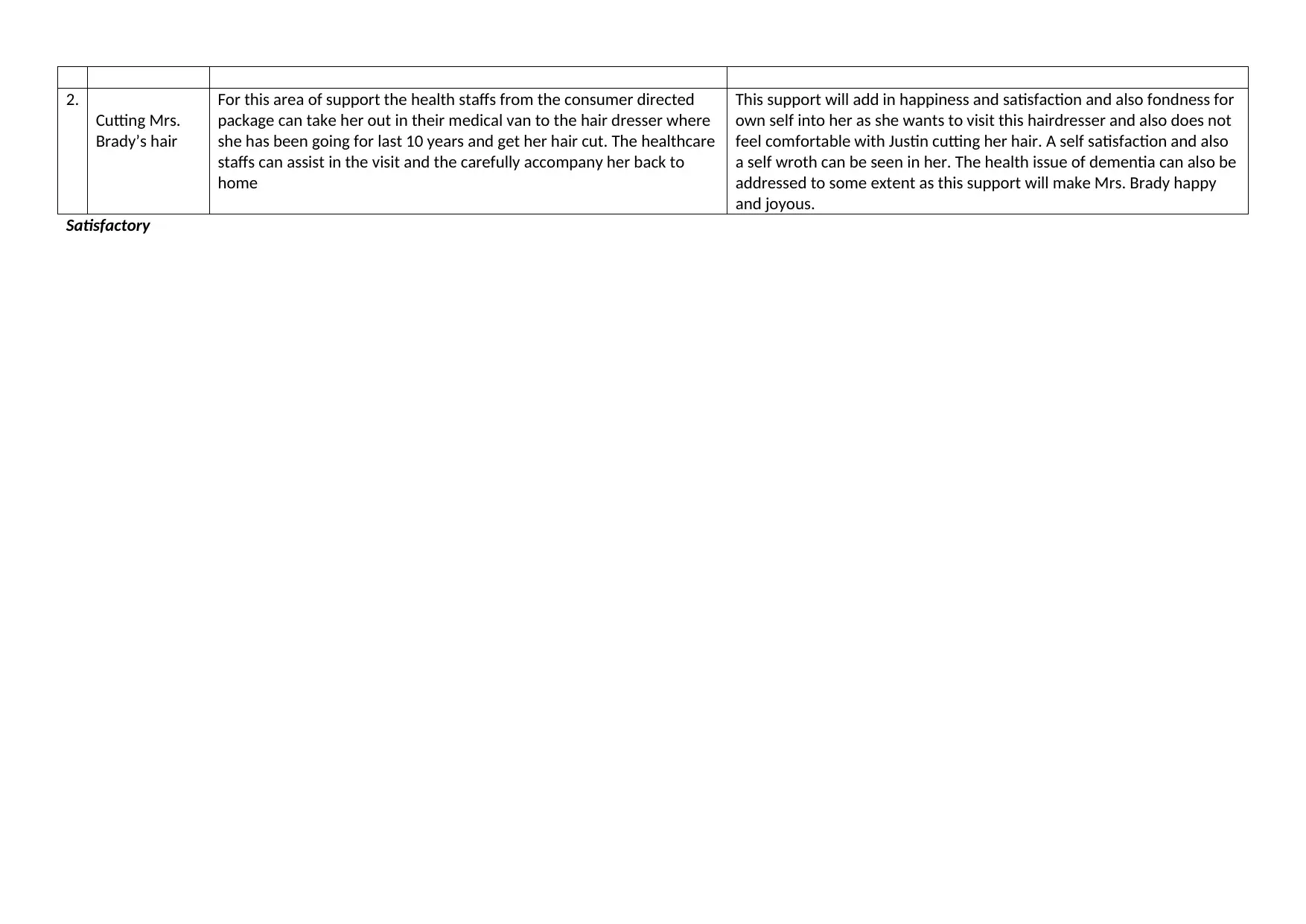
2.
Cutting Mrs.
Brady’s hair
For this area of support the health staffs from the consumer directed
package can take her out in their medical van to the hair dresser where
she has been going for last 10 years and get her hair cut. The healthcare
staffs can assist in the visit and the carefully accompany her back to
home
This support will add in happiness and satisfaction and also fondness for
own self into her as she wants to visit this hairdresser and also does not
feel comfortable with Justin cutting her hair. A self satisfaction and also
a self wroth can be seen in her. The health issue of dementia can also be
addressed to some extent as this support will make Mrs. Brady happy
and joyous.
Satisfactory
Cutting Mrs.
Brady’s hair
For this area of support the health staffs from the consumer directed
package can take her out in their medical van to the hair dresser where
she has been going for last 10 years and get her hair cut. The healthcare
staffs can assist in the visit and the carefully accompany her back to
home
This support will add in happiness and satisfaction and also fondness for
own self into her as she wants to visit this hairdresser and also does not
feel comfortable with Justin cutting her hair. A self satisfaction and also
a self wroth can be seen in her. The health issue of dementia can also be
addressed to some extent as this support will make Mrs. Brady happy
and joyous.
Satisfactory
Paraphrase This Document
Need a fresh take? Get an instant paraphrase of this document with our AI Paraphraser

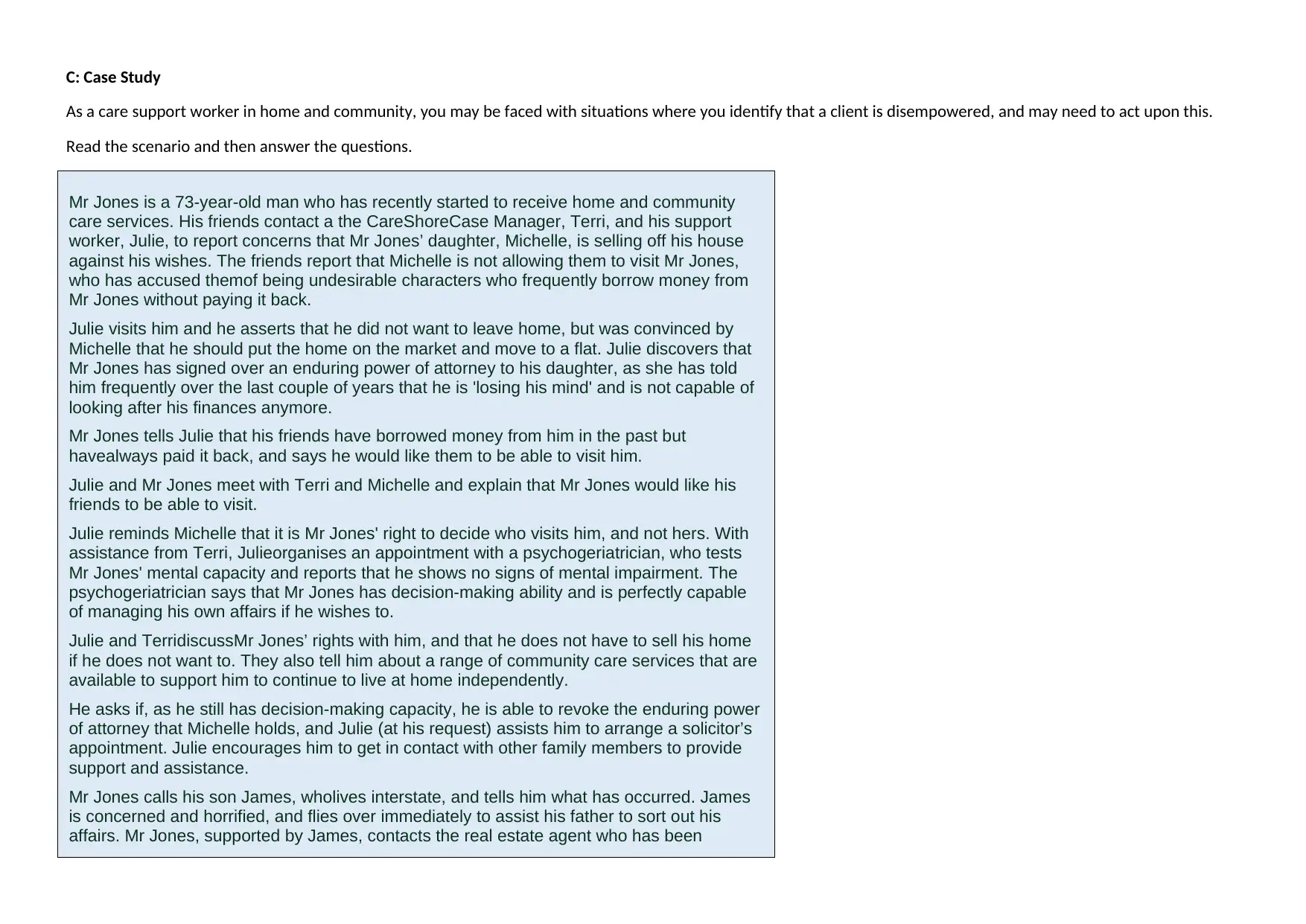
C: Case Study
As a care support worker in home and community, you may be faced with situations where you identify that a client is disempowered, and may need to act upon this.
Read the scenario and then answer the questions.
Mr Jones is a 73-year-old man who has recently started to receive home and community
care services. His friends contact a the CareShoreCase Manager, Terri, and his support
worker, Julie, to report concerns that Mr Jones’ daughter, Michelle, is selling off his house
against his wishes. The friends report that Michelle is not allowing them to visit Mr Jones,
who has accused themof being undesirable characters who frequently borrow money from
Mr Jones without paying it back.
Julie visits him and he asserts that he did not want to leave home, but was convinced by
Michelle that he should put the home on the market and move to a flat. Julie discovers that
Mr Jones has signed over an enduring power of attorney to his daughter, as she has told
him frequently over the last couple of years that he is 'losing his mind' and is not capable of
looking after his finances anymore.
Mr Jones tells Julie that his friends have borrowed money from him in the past but
havealways paid it back, and says he would like them to be able to visit him.
Julie and Mr Jones meet with Terri and Michelle and explain that Mr Jones would like his
friends to be able to visit.
Julie reminds Michelle that it is Mr Jones' right to decide who visits him, and not hers. With
assistance from Terri, Julieorganises an appointment with a psychogeriatrician, who tests
Mr Jones' mental capacity and reports that he shows no signs of mental impairment. The
psychogeriatrician says that Mr Jones has decision-making ability and is perfectly capable
of managing his own affairs if he wishes to.
Julie and TerridiscussMr Jones’ rights with him, and that he does not have to sell his home
if he does not want to. They also tell him about a range of community care services that are
available to support him to continue to live at home independently.
He asks if, as he still has decision-making capacity, he is able to revoke the enduring power
of attorney that Michelle holds, and Julie (at his request) assists him to arrange a solicitor’s
appointment. Julie encourages him to get in contact with other family members to provide
support and assistance.
Mr Jones calls his son James, wholives interstate, and tells him what has occurred. James
is concerned and horrified, and flies over immediately to assist his father to sort out his
affairs. Mr Jones, supported by James, contacts the real estate agent who has been
As a care support worker in home and community, you may be faced with situations where you identify that a client is disempowered, and may need to act upon this.
Read the scenario and then answer the questions.
Mr Jones is a 73-year-old man who has recently started to receive home and community
care services. His friends contact a the CareShoreCase Manager, Terri, and his support
worker, Julie, to report concerns that Mr Jones’ daughter, Michelle, is selling off his house
against his wishes. The friends report that Michelle is not allowing them to visit Mr Jones,
who has accused themof being undesirable characters who frequently borrow money from
Mr Jones without paying it back.
Julie visits him and he asserts that he did not want to leave home, but was convinced by
Michelle that he should put the home on the market and move to a flat. Julie discovers that
Mr Jones has signed over an enduring power of attorney to his daughter, as she has told
him frequently over the last couple of years that he is 'losing his mind' and is not capable of
looking after his finances anymore.
Mr Jones tells Julie that his friends have borrowed money from him in the past but
havealways paid it back, and says he would like them to be able to visit him.
Julie and Mr Jones meet with Terri and Michelle and explain that Mr Jones would like his
friends to be able to visit.
Julie reminds Michelle that it is Mr Jones' right to decide who visits him, and not hers. With
assistance from Terri, Julieorganises an appointment with a psychogeriatrician, who tests
Mr Jones' mental capacity and reports that he shows no signs of mental impairment. The
psychogeriatrician says that Mr Jones has decision-making ability and is perfectly capable
of managing his own affairs if he wishes to.
Julie and TerridiscussMr Jones’ rights with him, and that he does not have to sell his home
if he does not want to. They also tell him about a range of community care services that are
available to support him to continue to live at home independently.
He asks if, as he still has decision-making capacity, he is able to revoke the enduring power
of attorney that Michelle holds, and Julie (at his request) assists him to arrange a solicitor’s
appointment. Julie encourages him to get in contact with other family members to provide
support and assistance.
Mr Jones calls his son James, wholives interstate, and tells him what has occurred. James
is concerned and horrified, and flies over immediately to assist his father to sort out his
affairs. Mr Jones, supported by James, contacts the real estate agent who has been
⊘ This is a preview!⊘
Do you want full access?
Subscribe today to unlock all pages.

Trusted by 1+ million students worldwide
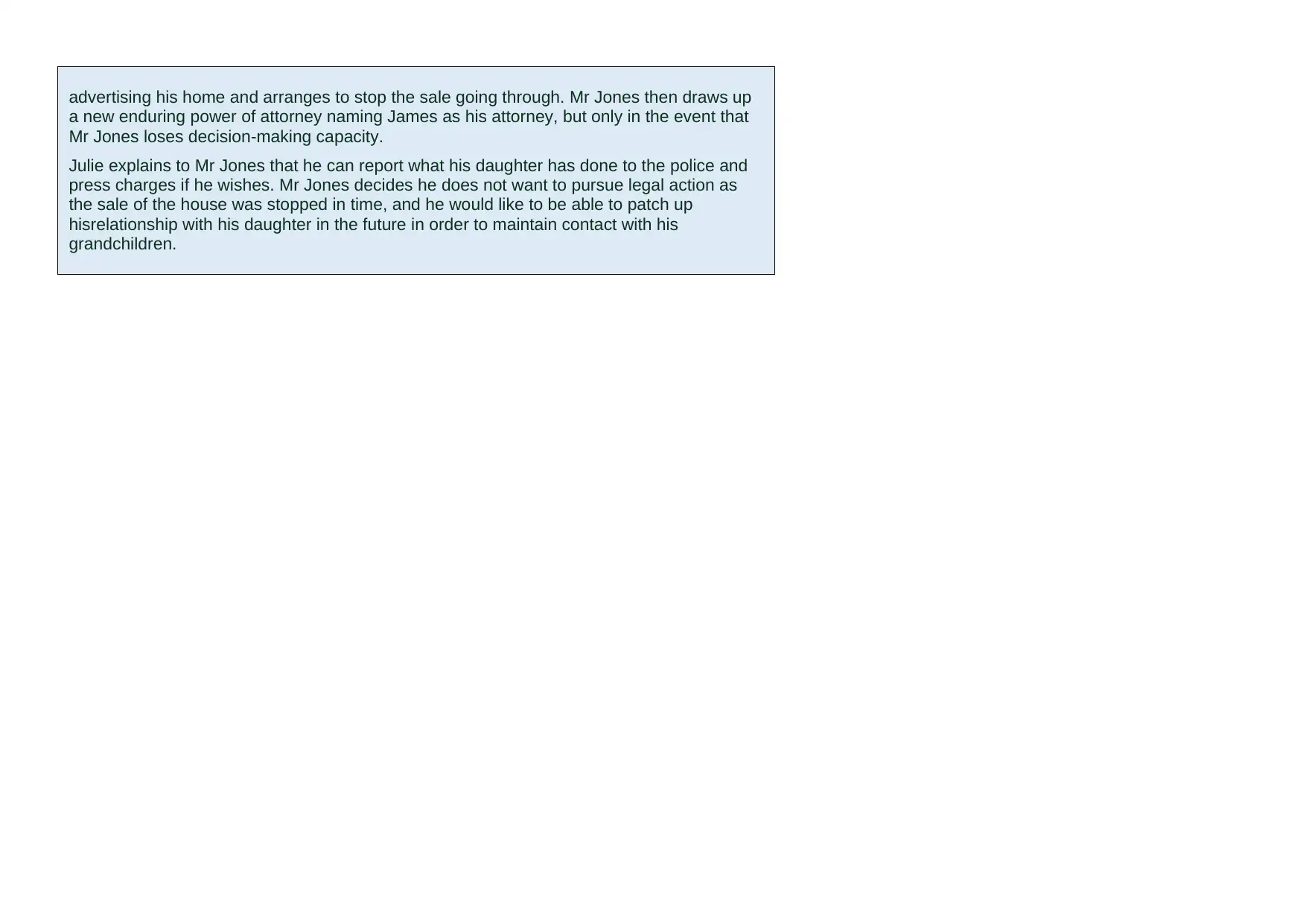
advertising his home and arranges to stop the sale going through. Mr Jones then draws up
a new enduring power of attorney naming James as his attorney, but only in the event that
Mr Jones loses decision-making capacity.
Julie explains to Mr Jones that he can report what his daughter has done to the police and
press charges if he wishes. Mr Jones decides he does not want to pursue legal action as
the sale of the house was stopped in time, and he would like to be able to patch up
hisrelationship with his daughter in the future in order to maintain contact with his
grandchildren.
a new enduring power of attorney naming James as his attorney, but only in the event that
Mr Jones loses decision-making capacity.
Julie explains to Mr Jones that he can report what his daughter has done to the police and
press charges if he wishes. Mr Jones decides he does not want to pursue legal action as
the sale of the house was stopped in time, and he would like to be able to patch up
hisrelationship with his daughter in the future in order to maintain contact with his
grandchildren.
Paraphrase This Document
Need a fresh take? Get an instant paraphrase of this document with our AI Paraphraser
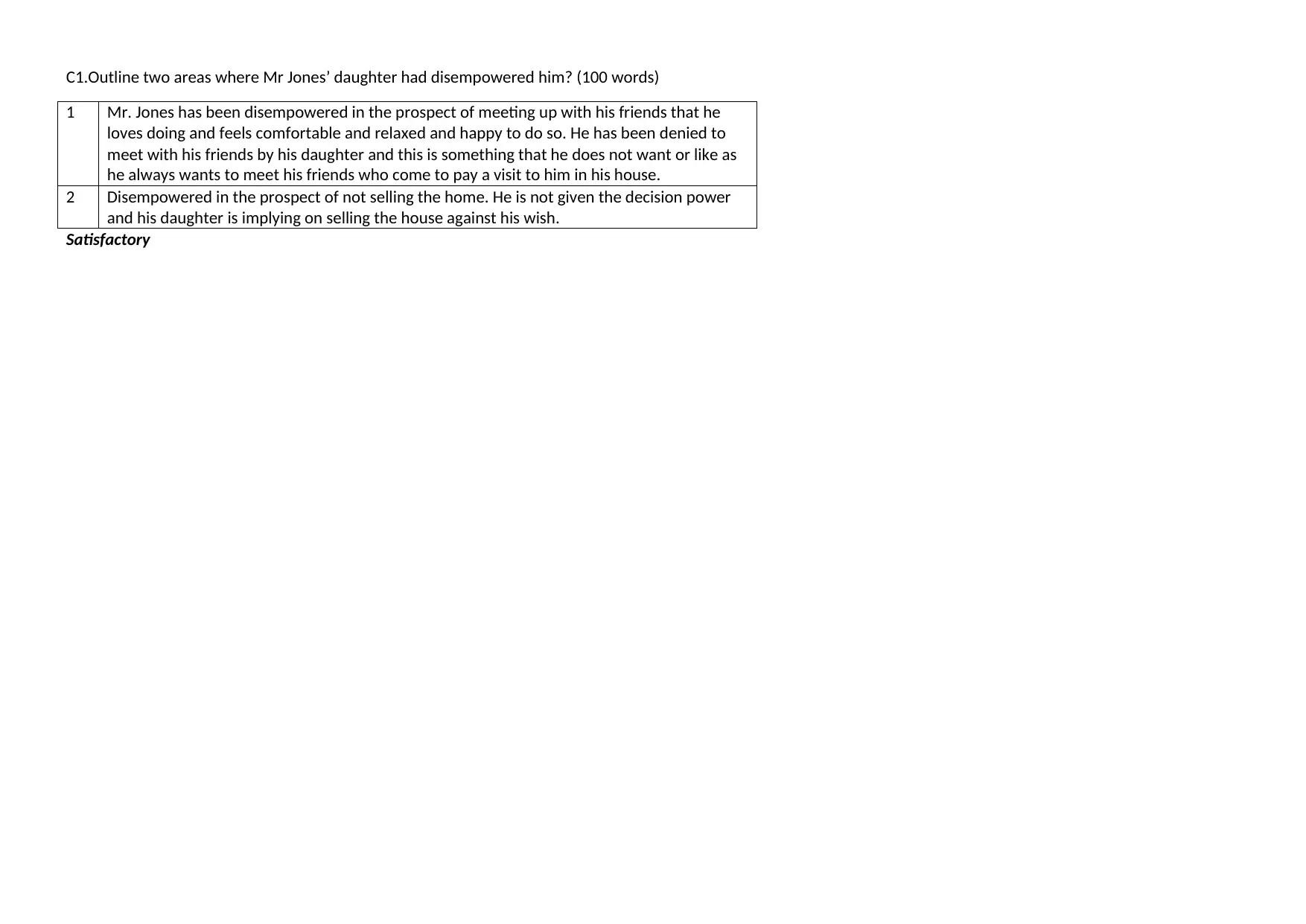
C1.Outline two areas where Mr Jones’ daughter had disempowered him? (100 words)
1 Mr. Jones has been disempowered in the prospect of meeting up with his friends that he
loves doing and feels comfortable and relaxed and happy to do so. He has been denied to
meet with his friends by his daughter and this is something that he does not want or like as
he always wants to meet his friends who come to pay a visit to him in his house.
2 Disempowered in the prospect of not selling the home. He is not given the decision power
and his daughter is implying on selling the house against his wish.
Satisfactory
1 Mr. Jones has been disempowered in the prospect of meeting up with his friends that he
loves doing and feels comfortable and relaxed and happy to do so. He has been denied to
meet with his friends by his daughter and this is something that he does not want or like as
he always wants to meet his friends who come to pay a visit to him in his house.
2 Disempowered in the prospect of not selling the home. He is not given the decision power
and his daughter is implying on selling the house against his wish.
Satisfactory
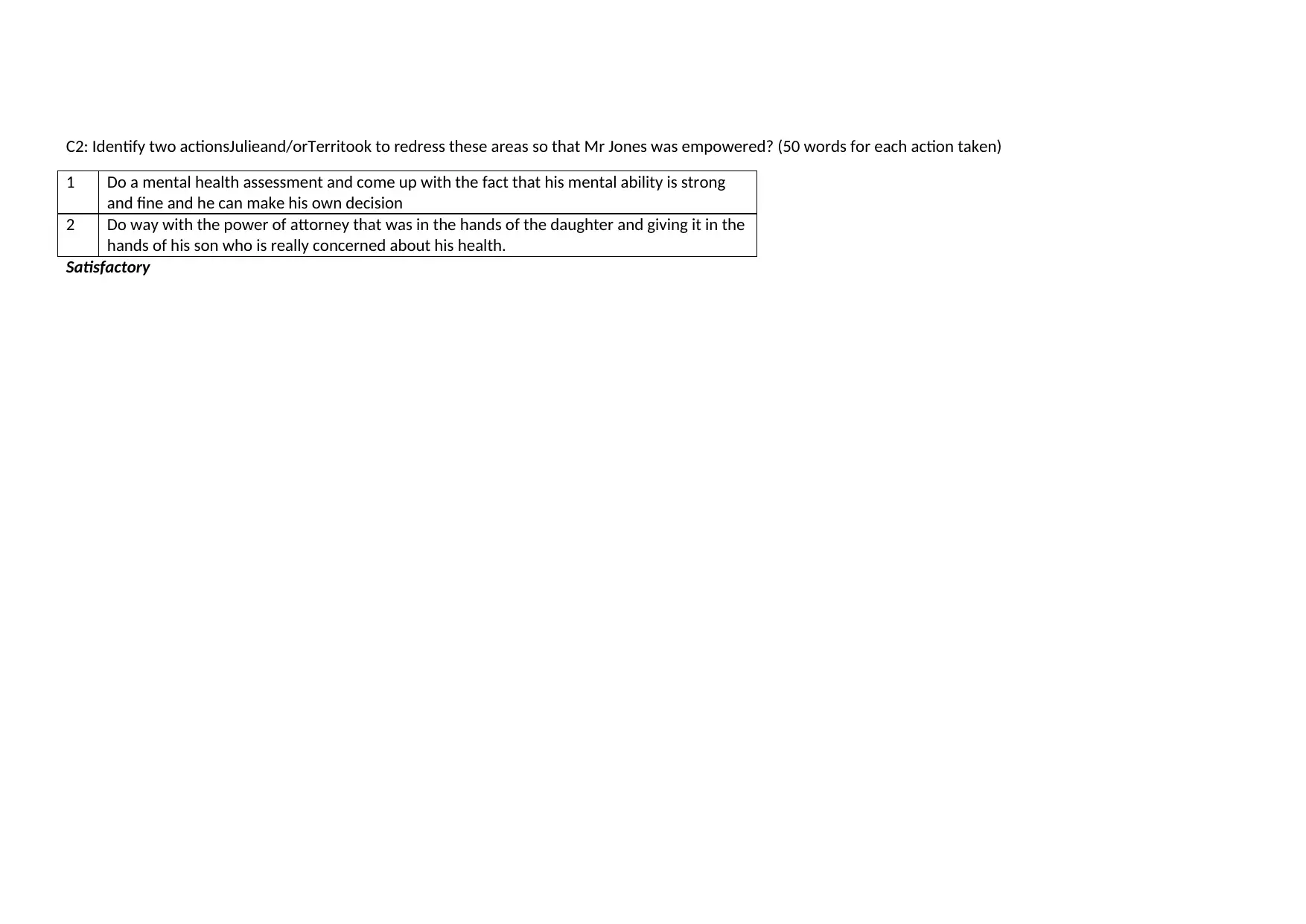
C2: Identify two actionsJulieand/orTerritook to redress these areas so that Mr Jones was empowered? (50 words for each action taken)
1 Do a mental health assessment and come up with the fact that his mental ability is strong
and fine and he can make his own decision
2 Do way with the power of attorney that was in the hands of the daughter and giving it in the
hands of his son who is really concerned about his health.
Satisfactory
1 Do a mental health assessment and come up with the fact that his mental ability is strong
and fine and he can make his own decision
2 Do way with the power of attorney that was in the hands of the daughter and giving it in the
hands of his son who is really concerned about his health.
Satisfactory
⊘ This is a preview!⊘
Do you want full access?
Subscribe today to unlock all pages.

Trusted by 1+ million students worldwide
1 out of 33
Related Documents
Your All-in-One AI-Powered Toolkit for Academic Success.
+13062052269
info@desklib.com
Available 24*7 on WhatsApp / Email
![[object Object]](/_next/static/media/star-bottom.7253800d.svg)
Unlock your academic potential
Copyright © 2020–2026 A2Z Services. All Rights Reserved. Developed and managed by ZUCOL.





